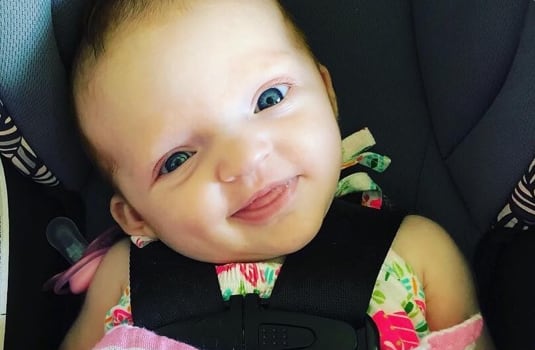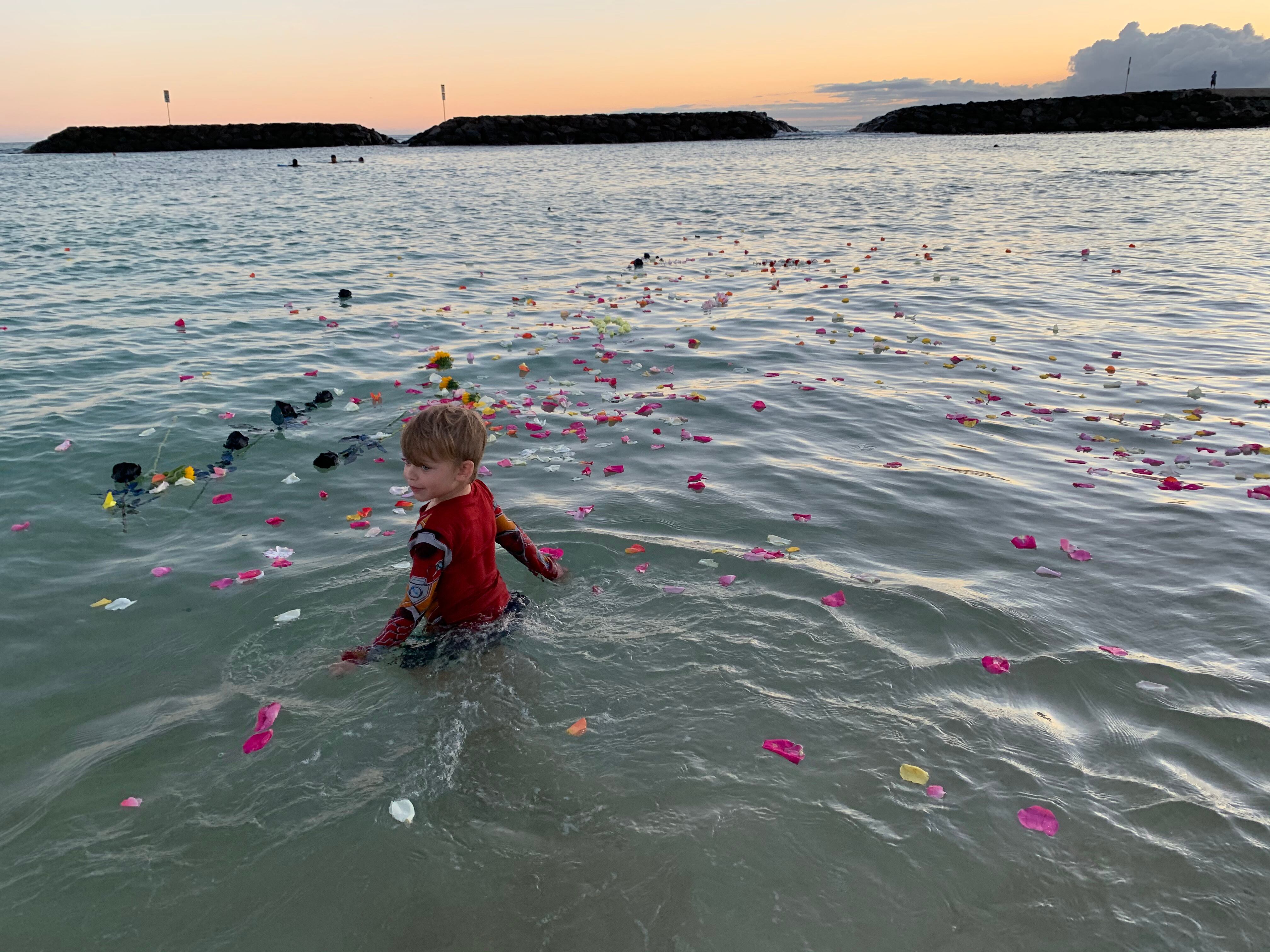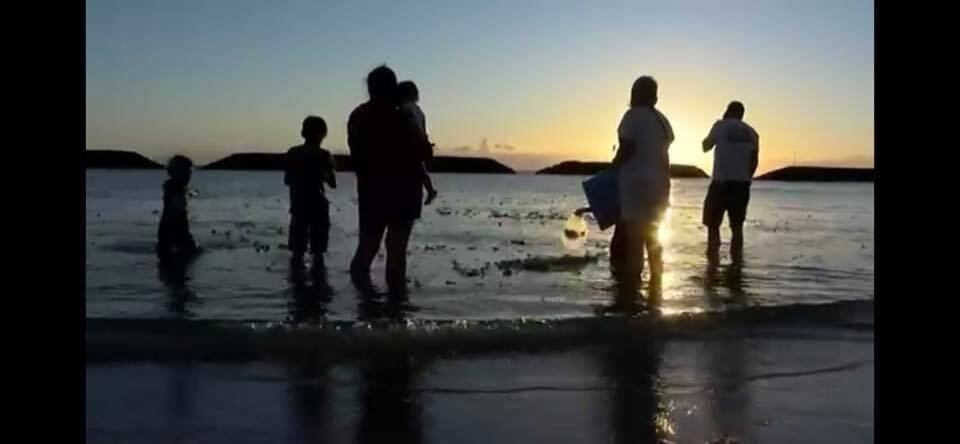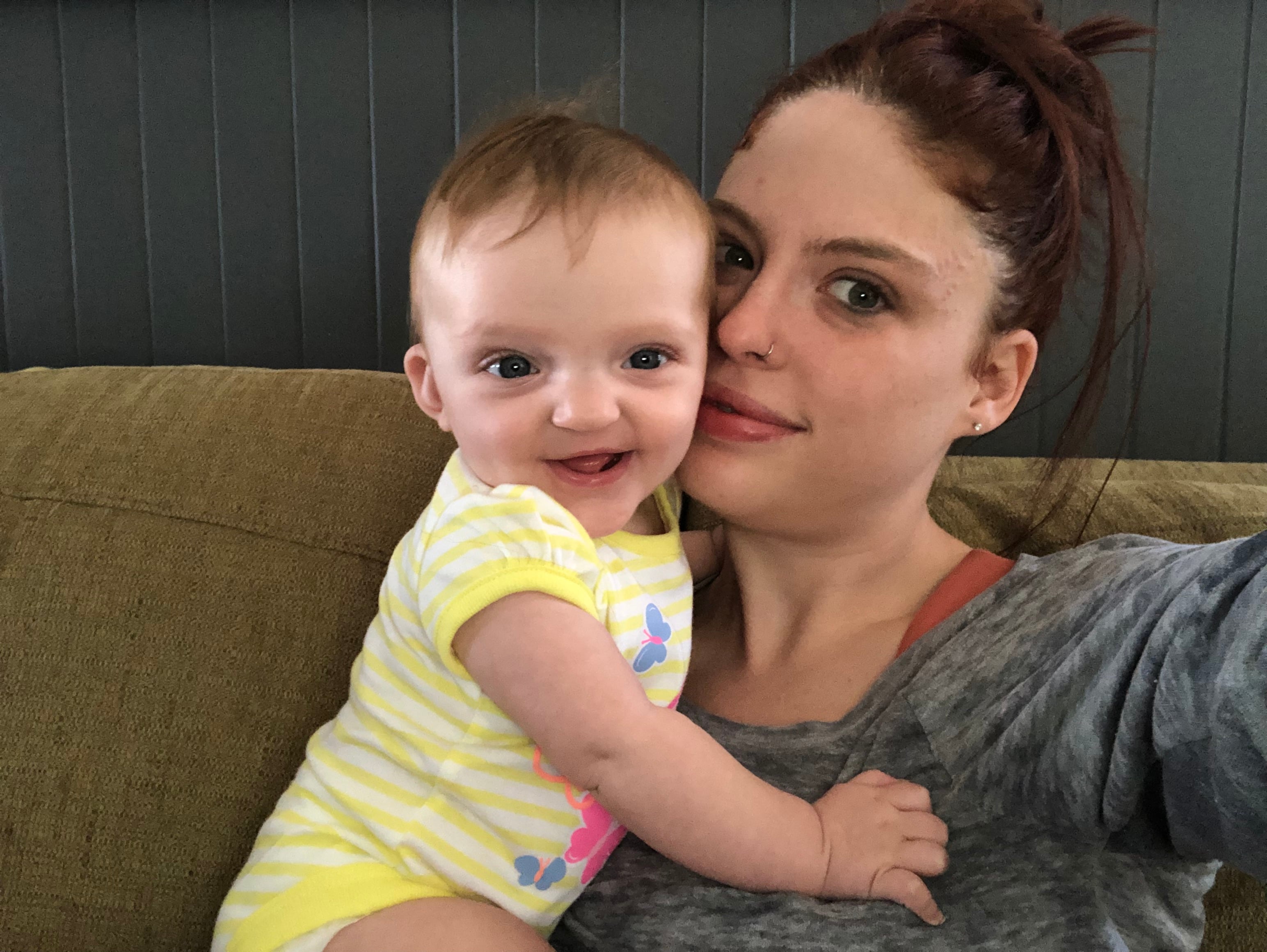On July 16, Anna Lobisch celebrated her baby daughter Abigail’s second birthday without her, dealing with the flood of emotions as she scattered flowers in the water where they had spread Abigail’s ashes last year.
“We are devastated without Abigail,” said Lobisch, about the death of her daughter in a babysitter’s house at Aliamanu Military Reservation in Hawaii on Feb. 24, 2019, when she was 7 months old. Abigail’s father is a member of the Army National Guard.
“It shouldn’t be like this,” Lobisch said. “She should still be with us. We have missed out on so much, and so has she.” She and a small group of family and friends gathered to sing “Happy Birthday” to Abigail and scatter the flowers, at Magic Island in Hawaii. Lobisch also ordered a custom-made birthday cake, with rainbows and sunflowers.
“Abi was our rainbow baby, and sunflowers were the theme of her funeral.”
Lobisch said she struggles with questions about events leading up to her baby’s death.
Because of Abigail’s death, Army Hawaii launched an investigation into unauthorized child care on its bases. Investigators found a disjointed system of different agencies’ response to the reports of alleged violations and lack of clear procedures for dealing with the violations, according to a report of the investigation, obtained by Military Times through a Freedom of Information Act request. A number of factors contributed to the prevalence of unauthorized child care providers, including the lack of available child care — there were more than 500 Army children on wait lists for child care Hawaii in 2018.
Among other things, those investigators recommended the service members in general be held accountable for the spouse’s actions violating the child care requirements, possibly taking steps to making it punishable under the Uniform Code of Military Justice or federal law. Army Hawaii officials declined to take that step, according to the FOIA documents. Army headquarters officials told Military Times they are not pursuing that move, either. But Army Hawaii officials are now routing violation notice letters through battalion commanders, before providing them to soldiers where suspected unauthorized care is happening.
Investigators did not address the Lobisch case, although the Lobisch case prompted the investigation.
Despite the findings of the investigation, which resulted in some changes in Hawaii, Lobisch wants more. The investigation didn’t address why more action wasn’t taken to follow up on multiple reports and force the sitter to stop providing child care. Following one report of children playing with a lighter in the babysitter’s yard, military police went to the house and found 17 children and one adult present. That was more than a year before Abigail’s death. In a broader sense, Lobisch and others are concerned this lack of accountability could endanger the lives of other military children at other installations.
“I would like to call for an external investigation into the Army, because there are still many questions left unanswered surrounding the death of our daughter Abigail,” said Lobisch. “There needs to be accountability for what happened.”
Officials from Army Hawaii have not answered questions from Military Times about what happened with the multiple reports, citing concerns about protecting the integrity of the Honolulu Police Department’s investigation into Abigail’s death and subsequent criminal proceedings. “Interviewing the same witnesses about the same events in a parallel administrative investigation can significantly disrupt an ongoing criminal investigation and trial. As such, the command’s administrative investigation focused on the systems and processes in place for certifying, monitoring and regulating in-home family child care as a whole,” Army Hawaii officials said in a statement to Military Times.
The command “supports State efforts to ensure justice for Abigail. Army officials cooperated fully in the criminal investigation and with all HPD requests regarding related Army reports and statements.
“This is an ongoing criminal matter, and no further information will be released to protect the integrity of the investigation and proceedings.”
Death and consequences
According to the Honolulu medical examiner’s report, Abigail died from an overdose of the over-the counter antihistamine diphenhydramine, the active ingredient in Benadryl and other similar medications. The babysitter, Navy spouse Dixie Denise Villa, is awaiting trial on charges of manslaughter in the civilian Hawaii court system. The investigation into the baby’s death has been handled solely by the Honolulu Police Department.
But aside from the criminal investigation, Abigail’s death raised questions about the Army’s regulation of — and response to reports of — unauthorized child care in military housing. On Feb. 26, 2019, two days after Abigail’s death, the U.S. Army Hawaii commanding general started an investigation into family child care on all Army installations in that state.
That investigation found that the garrison and privatized housing landlord hadn’t been able to set up a “consistent, streamlined process for enforcing the termination of housing privileges for [unauthorized child care providers] identified as repeat offenders,” according to the 902-page report of the investigation, which was completed in June, 2019, and obtained recently through a FOIA request by Military Times.
Army Hawaii officials hadn’t established a system for enforcing the eviction of unauthorized child care providers who are repeat offenders; and there were no documented standardized procedures for military police to follow when called to help handle these cases. Collection of evidence to substantiate a report of unauthorized child care can be difficult. Some accused providers say they are “just helping out a friend... this one time.... [and/or] not getting paid,” because they are aware of the rules, according to the documents via FOIA. Army Hawaii officials announced in April they have updated the protocols for military police called to these cases.
Yet the investigation didn’t address what specifically happened with a number of reports leading up to Abigail’s death about concerns for safety of the children left in the care of the babysitter.
“It’s frustrating to see how many people, up and down the chain of command, including those with privatized housing, can be aware someone is running an unauthorized day care. Yet there is no eviction or barring because there is a ‘shortfall in the enforcement,’ " said Air Force wife Katie Camario — a neighbor who made a number of reports to authorities because of her concerns for the children’s safety — in an interview with Military Times. “Unfortunately, this lack of enforcement left Abigail and the other children there without the protection this policy is supposed to give them.”
The day Abigail died, Camario said, “I witnessed the agonizing pain and frustration expressed by the [military police investigators] on scene. Those same officers were at that house trying to end the unlicensed care for over a year, but something had their hands tied and they couldn’t make her stop. Who could?”
According to the findings of the Army Hawaii investigation, procedures were so disjointed between different organizations on base that there wasn’t a clear-cut path to force unauthorized sitters to stop, including eviction.
The Army investigators found that a lack of follow-through by Island Palm Communities, the privatized housing landlord, also contributed to a policy that’s minimally enforced. When the privatized housing landlord received copies of cease-and-desist letters about unauthorized child care in their housing, they merely noted it in the resident’s file as a minor infraction, according to the FOIA documents. That was a “minor infraction,” but according to the housing handbook, “poor housekeeping” was a major infraction that could result in eviction.
RELATED

Not enough child care
The report stated in 2018, there were more than 500 Army children age pre-school and under in Hawaii, on wait lists for spots within a child development center or family child care home.
The limited amount of child care within U.S. Army Hawaii likely contributed to the prevalence of unauthorized child care providers, investigators found. They didn’t specify a number of unauthorized providers, but a Family Child Care office log among the FOIA documents showed four reports in early 2018, and 27 reports between March and April of 2019. It’s not clear whether there are multiple calls on the same residence, because the addresses are redacted.
Investigators cited record-keeping, policy, systems, and methods for addressing repeat offenders as hindrances to enforcing the policy prohibiting unauthorized child care. Although the Family Child Care officials had a sound standard operating procedure in place for handling repeat offenders, they were in the process of developing more comprehensive and strict procedures, investigators noted.
That’s a core problem for many military families — lack of available, quality, affordable child care. Defense and service officials have been taking some steps to address the issue, but that problem is now being exacerbated by the pandemic.
The Army Hawaii investigators found that the amount of time it takes to become a certified family child care provider on base can be daunting, because of rigorous requirements. While ideally it would take 90 days, it takes anywhere from six to 14 months. A new Army Installation Management Command process for streamlining the background check process was effective March 15, 2019, according to the documents.
Army Hawaii officials have streamlined application procedures for would-be child care providers, and are more closely monitoring new provider requests to make sure the required home inspections and background screenings are completed more quickly. They’ve also streamlined application procedures to make the certification process faster for certified child care providers coming in from other installations.

Army-wide changes
In a July 15 response to Military Times’ questions, Army officials stated they are making changes across the Army to shore up enforcement of the policy prohibiting unauthorized child care in military housing. A month after Abigail’s death, they ordered all garrisons to develop teams to establish local standard operating procedures clarifying the rules and responsibilities governing the provision of child care in housing, and how to address instances of unauthorized child care. All Army garrisons have complied with the order to submit their locally developed plans to Army Installation Management Command officials, according to the Army statement.
In addition, a Child and Youth Services guide for garrison leaders released in February addresses and defines unauthorized child care in government quarters and defines the parameters for the 10-hour rule limitation on providing child care by unlicensed caregivers, officials said. Officials have also been conducting information campaigns to make parents aware of the requirement for certification in order to provide child care.
In an interview two months after Abigail died, Lobisch said the first she knew about the reports of concern for the military children was the day Abigail died, when neighbors told her what they had reported previously to authorities. “If I’d known that all those things had happened… I felt so upset. If I had known there were reports of neglect, I would have taken my children out so fast.
“Abigail would be alive,” she said. “I wanted my children to be safe. That’s my main priority.”
“I didn’t even know about unlicensed care before this happened,” Anna said. “Licensing never came to my mind. I guess I wasn’t really educated. I didn’t have any idea what that was. I had zero indication that was happening.”
Family child care officials at Army Hawaii have begun education campaigns to make parents aware of the requirements, which was one recommendation in the Army investigation, according to the FOIA documents. And officials there have also updated their standard procedures for dealing with reports and repeat offenders of the child care policy.
Camario, the neighbor of the sitter’s house where Abigail died, said the problem needs to be addressed across DoD. “Sadly, unauthorized child care homes will not disappear until all services get a handle on child care availability,” she said. “And because of that, DoD must take this opportunity to use the findings and recommendations to build a clearer policy, all the while conducting adequate training of their decision makers throughout all branches,” she said.
Defense Department officials have reviewed their policy regarding family child care, and “determined there are not any gaps in the current DoD policy,” said DoD spokeswoman Jessica Maxwell, who said the responsibility was in the hands of local commanders.
She cited a Sept. 6 memo that “reiterated these policies and the responsibilities of the installation leadership to address unauthorized child care and to follow up with appropriate actions, as necessary.”
By DoD regulations, anyone who provides child care for more than 10 hours a week on a regular basis in their home on a military installation must go through a certification process to ensure that children are safe and well cared for.
They undergo stringent reviews and training before being certified and allowed to operate the business. They must undergo fire and safety inspections, and provide a learning curriculum tailored for the child’s age. There are also limitations on the number of children that are allowed at any given time in the provider’s home.
“One of the most important responsibilities of the FCC director is to prevent unauthorized child care on the installation,” states the Army’s 1996 Family Child Care directors’ handbook, included in its entirety as one of the documents in the FOIA report.
“Unauthorized care poses high risks to children and creates liability for the government.”

Questions left unanswered in Abigail’s case
The Army Hawaii investigation report obtained through FOIA briefly addressed the reports made about child care at the Abigail’s sitter’s residence, without identifying the residence or addressing what happened to the reports.
It stated there had been a report to Family Child Care officials on Jan. 8, 2018 of young children playing with a lighter in the babysitter’s backyard. Those officials advised the caller to immediately call the military police. A half hour later, the Fort Shafter military police station contacted the FCC officials to report that there were 17 children and one adult caregiver at the residence, according to the FOIA document. Three days later, FCC officials made a visit to the babysitter’s home. That was 13 months before Abigail’s death.
The report notes another report made on Feb. 21, 2019, three days before Abigail’s death.
Camario, Villa’s neighbor, confirmed to Military Times those were her calls, and they weren’t the only calls.
The investigative report obtained by FOIA doesn’t mention additional reports Camario said she made — including her first phone calls to Family Child Care and the housing landlord’s office in December, 2017. She contacted FCC again in early January, 2018, before the Jan. 8 incident of young children playing with a lighter. Numerous incidents of email correspondence followed, Camario said.
“This investigative report sounds to me like nobody was in charge to see it through and make the call” to remove the babysitter from housing, she said.
“In Abigail’s case, there was complete documentation up and down and sideways and she still died,” Camario said.
But the upshot of the Army Hawaii investigative report, Lobisch said, is “We have no idea how those reports were handled or whether they were followed through. We need answers.” She said she had no idea about these reports before her daughter died.
Lobisch said no one from the Army Hawaii investigating team interviewed her. Nor did they interview Camario, who had made multiple reports about things she saw that concerned her, including very young children crying outside, unsupervised, and one child’s head being stuck in playground equipment.
Army Hawaii officials said in a their statement to Military Times that interviewing the same witnesses about the same events in a parallel administrative investigation can disrupt an ongoing criminal investigation and trial.
The Army Hawaii report obtained through FOIA stated investigators were directed to make findings on overall current regulatory and internal processes for certifying, monitoring and terminating child care provider privileges; mechanisms in place for reporting incidents of unauthorized child care, and needed modifications or improvements.
It didn’t direct investigators to make findings on the specifics of the reports in Abigail’s babysitter’s case.
The Hawaii Police Department was the lead agency in investigating Abigail’s death.
In an April press release, Army Hawaii officials said they have updated their standard procedures to streamline and strengthen the process to follow up on reports of unauthorized child care.
Change to UCMJ?
As a result of the investigation, Army officials in Hawaii have taken measures to shore up their procedures for monitoring and enforcing the regulations which allow for eviction of repeat offenders.
But one recommendation by the investigators, and not adopted by Maj. Gen. Ronald Clark, then-commanding general of U.S. Army Hawaii, was to incorporate the prohibition against unauthorized child care into U.S. Army Hawaii regulations of standards and discipline, as a punitive provision. That could make it punishable under the Uniform Code of Military Justice or federal law, according to the investigating officer, and would hold the service member at the residence accountable.
Camario contends that would have put some teeth into the process. “If they weren’t able to make that civilian spouse follow military regulations on a military installation, then the onus has to fall on the active duty member,” she said. “After all, when it comes to privatized housing, they’re the ones who are on the lease of the home where the policy is being violated.”
There’s no current Army initiative to ask Congress to make this a federal criminal offense, according to the Army statement. “However, depending upon the circumstances, an individual who provides unauthorized child care on an installation may be in violation of other UCMJ, federal or state laws,” officials stated.
‘Poor housekeeping’ could result in eviction, but not unauthorized child care
The Army investigator found that a lack of follow-through by Island Palm Communities contributed to a policy that’s minimally enforced. When the privatized housing landlord received copies of cease-and-desist letters about unauthorized child care in their housing, they merely noted it in the resident’s file as a minor infraction. The landlord has the ability to terminate the family’s housing privileges based on a garrison commander-directed debarment from post, or through a legal eviction process in state civil court.
But the handbook for residents of Island Palm Communities, the privatized housing community, didn’t state that a resident could be evicted for providing unauthorized child care.
Yet that handbook stated that “poor housekeeping” could result in eviction.
One witness told the investigator that there was only one case from several years ago that the unauthorized child care provider was evicted based on the FCC recommendations.
As a result of the investigation, the housing company has updated the handbook to characterize unauthorized child care as a “major violation” of resident leases, according to Army officials in Hawaii. That clears the path for possible eviction proceedings when unauthorized child care is substantiated.
The change was made in the summer of 2019. There have been no evictions from Island Palm Communities resulting from unauthorized child care since then, said Staci Burton, a spokeswoman for LendLease, the parent company of Island Palm Communities. LendLease had no further comment or response to the finding about the lack of follow-through on the part of Island Palm Communities.
Other changes by Army Hawaii in the wake of the investigation:
According to the garrison’s announcement in April, officials have also:
*Created an electronic database to track alleged incidents and allow faster follow-up.
*Developed a widespread information campaign on rules prohibiting unauthorized child care, and guidance on how to become an authorized provider.
*Started command orientation briefings on the issue for all newcomers.
Karen has covered military families, quality of life and consumer issues for Military Times for more than 30 years, and is co-author of a chapter on media coverage of military families in the book "A Battle Plan for Supporting Military Families." She previously worked for newspapers in Guam, Norfolk, Jacksonville, Fla., and Athens, Ga.





